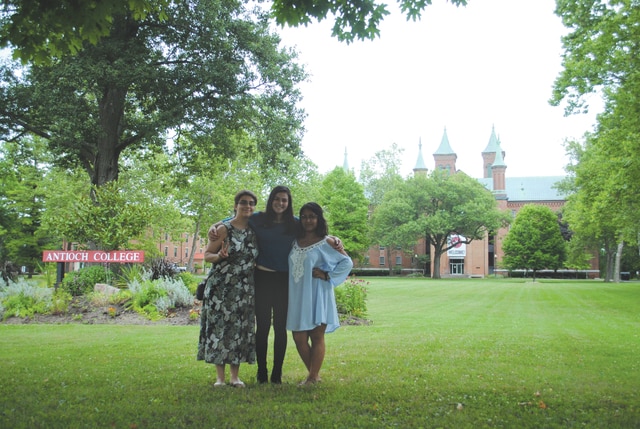
By Whitney Vickers
YELLOW SPRINGS — Michelle Fujii was just leaving class at Antioch College earlier this week and was greeted by shrieks of excitement in the hallway.
“I came out of class and someone shouted ‘we’ve been accredited,’ ” she said. “I thought we weren’t going to hear the news until next week. I was pretty sure we were going to get accredited, so it was like [a feeling of] peace and relief. Around campus I heard people shouting and yelling and people were hugging.”
That means the sophomore self-design major doesn’t have to worry about whether or not she will be accepted into graduate school, or if a future employer would question her college experience because her degree would have otherwise came from an unaccredited institution.
It also means future students are more likely receive federal financial aid, according to studentaid.ed.gov.
The Higher Learning Commission officially granted accreditation during the summer months, which means the class of 2016 will be the first group of students to have graduated from an accredited Antioch College since it re-opened its doors in 2011.
But Antioch College’s story doesn’t start here.
The 166-year-old institution was founded in 1850 and saw a number of new presidents set standards and a number of social advocacy actions take place throughout that time, according to its website. Financial troubles forced it to close its doors indefinitely in 2008, but the passion of alumni served as the driving force behind the college re-opening in 2011, separate from Antioch University.
“It’s an important moment in higher education,” said President Dr. Thomas Manley. “It’s not that Antioch College is back. It’s that it’s possible, even under difficult circumstances, to regenerate and reinvent, which is what we need to be doing more of as a society. It’s an amazing story and the people who are responsible for making that story come to life … all praise to those.”
Antioch College has been seeking accreditation for the last six years, according to Dr. Lori Collins-Hall, provost and vice president of academic affairs. She said that process started with paperwork, which allowed the institution to enter the process. It was named an official candidate for accreditation in June 2014. Collins-Hall said this involved another stack of paperwork and a sight visit by the HLC, which took place in fall 2015.
When Antioch College was granted candidacy status, it was placed on a fast-track, two-year path as opposed to the typical four-year path, which Collins-Hall said meant that Antioch College had the potential to be accredited quicker. However, college officials understood that they could lose that opportunity and be placed back on the four-year path — which didn’t happen. Collins-Hall said Antioch College was well-positioned when it was granted candidacy status and during its sight visit. Ultimately, Collins-Hall and Manley credit the heavy lifting applied by the alumni, faculty, staff and students throughout the process and said it was a community effort.
“It’s really exciting when you achieve it (accreditation) at the best possible scenario, which is to achieve it in a shorter time frame because you’ve really been able to demonstrate your case and to achieve it at the highest-possible level,” Collins-Hall said. “We were put on the standard path for accreditation, so our next review isn’t for another four-years. That’s typical of any four-year institution that’s healthy and strong.”
Students are taught in an interpersonal manner, said Collins-Hall, who added that classes typically include about 12 students. The college also owns Glen Helen, WYSO, farms, kitchens and other assets, which are utilized for project and experimental-based learning.
Antioch College terms are based on the quarter system as opposed to the semester system. Every few terms, students must participate in the college’s cooperative education, or co-op, program. During this time, students report to a workplace instead of the classroom and would be responsible for their own living arrangements as some co-op programs take students to different states or countries.
Sylvia Newman of the class of 2016 said she worked for a tea farm in Japan as her last co-op experience, which shifted her perspective related to pursuing her passions.
Manley said this sets Antioch College apart from other schools because participating in the co-op program is at the heart of a student completing their degree instead of a “bolted-on” requirement.
“It’s meant to place Antioch and the education we offer into the world,” Manley said. “That’s this idea of living ones education, applying it, experimenting with it and adapting it to the conditions you find … Live your education in service to something. That’s what we ask students to think about doing.”


